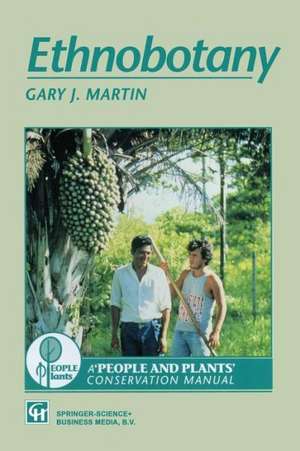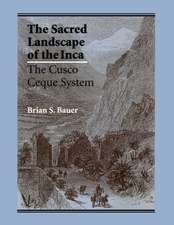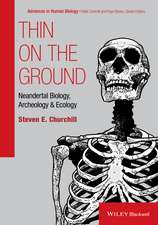Ethnobotany: A methods manual
Autor Gary J. Martinen Limba Engleză Paperback – 31 dec 1995
| Toate formatele și edițiile | Preț | Express |
|---|---|---|
| Paperback (2) | 449.07 lei 6-8 săpt. | |
| Taylor & Francis – 2004 | 449.07 lei 6-8 săpt. | |
| Springer Us – 31 dec 1995 | 640.55 lei 6-8 săpt. | |
| Hardback (1) | 1326.99 lei 6-8 săpt. | |
| Taylor & Francis – 2 noi 2015 | 1326.99 lei 6-8 săpt. |
Preț: 640.55 lei
Preț vechi: 753.60 lei
-15% Nou
Puncte Express: 961
Preț estimativ în valută:
122.59€ • 126.64$ • 102.02£
122.59€ • 126.64$ • 102.02£
Carte tipărită la comandă
Livrare economică 25 martie-08 aprilie
Preluare comenzi: 021 569.72.76
Specificații
ISBN-13: 9780412483707
ISBN-10: 041248370X
Pagini: 296
Ilustrații: 296 p. 11 illus.
Dimensiuni: 155 x 235 x 16 mm
Greutate: 0.42 kg
Ediția:Softcover reprint of the original 1st ed. 1995
Editura: Springer Us
Colecția Springer
Locul publicării:New York, NY, United States
ISBN-10: 041248370X
Pagini: 296
Ilustrații: 296 p. 11 illus.
Dimensiuni: 155 x 235 x 16 mm
Greutate: 0.42 kg
Ediția:Softcover reprint of the original 1st ed. 1995
Editura: Springer Us
Colecția Springer
Locul publicării:New York, NY, United States
Public țintă
ResearchCuprins
1 Data collection and hypothesis testing.- 2 Botany.- 3 Ethnopharmacology and related fields.- 4 Anthropology.- 5 Ecology.- 6 Economics.- 7 Linguistics.- 8 Ethnobotany, conservation and community development.- References.- Further reading.
Recenzii
I caught a glimpse of the table of contents, and it looks wonderful - Society for Economic Botany Newsletter; ...provides a detailed overview of this emerging discipline. Aimed primarily at researchers who are beginning field studies, it gives clear descriptions of the skills and methods most commonly employed by ethnobotanists. It will also be of interest to experienced field workers who wish to review new concepts and techniques drawn from botany, anthropology, economics, ethnopharmacology and other disciplines.. - Krypto News; However, in keeping the text firmly focused on the discussion of field techniques and rooted in a project base, with the use of real examples, Martin succeeds in providing some valuable information about research tools. I greatly appreciated the final section which offered ethical guidelines for conducting ethnobotanical studies with local people, communities and indigenous organisations. - International Journal of Environmental Studies; Nominated for the 1996 Society for Economic Botany Newsletter Outstanding Book Award
Notă biografică
Gary Martin is Director of the Global Diversity Foundation and a Research Fellow and Lecturer in the Anthropology Department at the University of Kent at Canterbury.
Descriere
Descriere de la o altă ediție sau format:
This book is the basic introduction to the field of ethnobotany, the study of the classification, use and management of plants by people. Drawing on a range of disciplines, including natural and social sciences, ehtnobotany enables the conservation of plants and of local knowledge about them. Published with WWF, UNESCO and Royal Botanic Gardens Kew.
This book is the basic introduction to the field of ethnobotany, the study of the classification, use and management of plants by people. Drawing on a range of disciplines, including natural and social sciences, ehtnobotany enables the conservation of plants and of local knowledge about them. Published with WWF, UNESCO and Royal Botanic Gardens Kew.
















